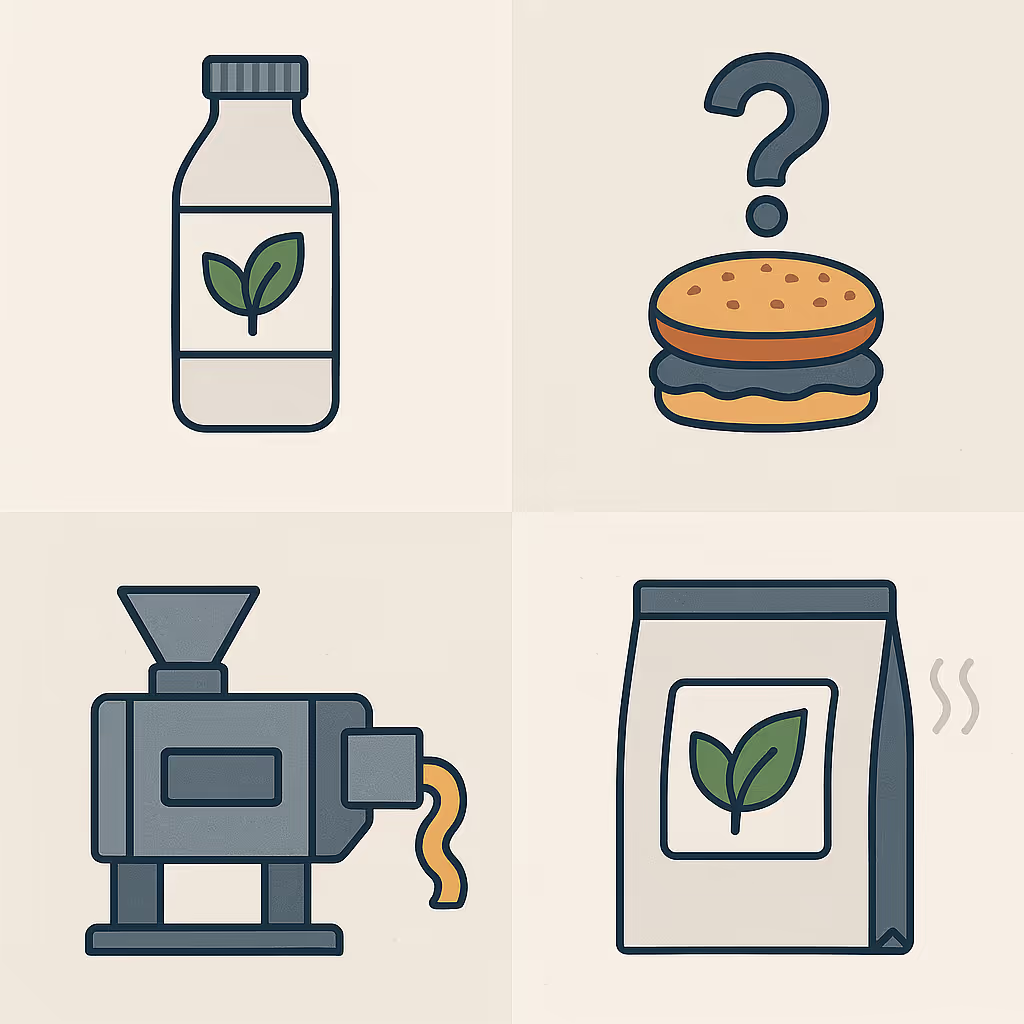Lead the plant‑based food revolution. Plant‑based product businesses across the U.S. are developing novel formulations (plant‑derived meat and seafood analogues, dairy alternatives, functional snack foods), adapting production/process systems for unconventional raw materials, creating clean‑label or allergen‑free packaging, and innovating sustainability and supply‑chain processes — many of these qualify for the federal R&D Tax Credit (IRC §41) and state credits.


Examples of qualifying activities in plant‑based food businesses
- Plant‑Protein Formulation & Texture Development Developing meat analogues from plant proteins, fermentation/precision‑fermentation trials, extruded snack foods, trials focused on texture, mouth‑feel, juiciness, flavour, and shelf stability.
- Production & Process Innovation for Novel Raw Materials Implementing new extrusion/fermentation lines, trials for handling plant proteins, stabilising vegan fats/oils, creating clean‑label systems free of major allergens, adapting fill/pack lines for plant‑based formats.
- Packaging & Shelf‑Life for Plant‑Based Formats Testing eco‑friendly packaging systems for vegan meals, barrier films suited to plant‑based fat matrices, freezer‑ or chilled‑stable pouches, distribution testing under supply‑chain stress for plant‑based products.
- Sustainability & Supply‑Chain Experimentation Innovating supply‑chain for unusual raw materials (single‑cell proteins, micro‑algae, precision‑fermentation), trials to reduce carbon footprint, new logistics for plant‑based formats, waste‑reduction in process lines.
What qualifies as R&D in Plant‑Based Food Businesses?

To qualify, your plant‑based business must:
- Target a permitted purpose — such as a new or improved plant‑based meat/seafood analogue, non‑dairy alternative, novel production method, new packaging or process integration for plant‑based raw materials.
- Address technical uncertainty — for example: “Can this new plant‑protein matrix replicate meat‑like texture, flavour and juiciness after cooking?”, “Will the new extrusion line maintain throughput and product integrity using insect‑free, clean‑label ingredients?”, “Can the packaging maintain shelf‑life for a vegan frozen entrée using eco‑film under freezer/cold‑chain conditions?”
- Use a process of experimentation — formulation trials of plant proteins, pilot extrusion/fermentation runs, packaging material trials for plant‑based formats, shelf‑life and stability testing, process redesign for plant raw‑material handling.
- Be technological in nature, grounded in food‑science (plant‑protein structure, extrusion/fermentation), materials engineering (packaging for plant‑based foods), automation/process engineering, sensor systems for production, or supply‑chain/thermal engineering.
Qualified Research Expenses (QREs)
Roles commonly involved in qualifying activities
- Food‑science/formulation engineers focusing on plant‑based product innovation
- Automation/process engineers adapting lines to plant‑based raw materials
- Packaging/material engineers specialising in plant‑based formats
- Test chefs or R&D culinary teams creating prototype recipes
- Supply‑chain/logistics engineers for plant‑based raw‑material flows
- External research labs or consultants for packaging, extrusion, fermentation or raw‑material trials
What does not qualify
- Routine manufacturing of plant‑based products without experimentation or improvement
- Purely sales, marketing, or administrative tasks
- Deploying an existing production or packaging process without addressing technical uncertainty or trialling improvements
- Simple facility expansion or new equipment purchase without a research/trial component
Compliance and Documentation
Following the One Big Beautiful Bill Act (OBBBA) signed July 4, 2025, §174 now allows immediate expensing of domestic research expenses for tax years beginning on or after January 1, 2025. Taxpayers may also elect optional amortization under new §174A. Foreign research expenses must still be amortized over 15 years. This is separate from the §41 credit but impacts overall tax planning.
Plant‑based businesses should document:
- Project descriptions identifying technical uncertainty (e.g., “Will this plant‑protein matrix yield 90% of meat equivalent texture after extrusion and cooking?”)
- Pilot runs, extrusion/fermentation logs, shelf‑life and sensory test results, packaging trials, raw‑material adaptions
- Time‑tracking and payroll/wage records for R&D/support personnel
- Material and packaging test results, software simulation output, version logs of experiments
- Summary of alternatives considered, trial outcomes, decision rationale and improvements achieved
Frequently Asked Questions
Yes — if the company is actively innovating in formulations, processing, packaging or supply‑chain of plant‑based foods rather than simply producing an existing product.
Wages tied to R&D/trials, supplies/prototype materials (plant‑protein raw materials, packaging, consumables), software/data tools used for modelling or analysis, and third‑party lab/vendor costs tied to research experiments.
Examples include: formulating a new plant‑protein meat analogue, trial‑running extrusion/fermentation systems, validating eco‑packaging for vegan meals, logistics trials for novel raw materials.
Routine production, using established production systems without testing/experimentation, scaling without innovation, or non‑technical tasks like marketing or general administration.
Savings vary, but many plant‑based innovators capture credits up to ~22% of qualified research expenses when properly documented and claimed.
Maintain detailed hypotheses, pilot‑run logs, texture/sensory test data, packaging/film test results, version/control logs, time tracking of R&D staff, material‑raw‑ingredient test results, and summaries of experimentation and decision points.
Next Steps
Use our calculator to estimate your potential federal and state benefits
Schedule a consultation to structure your row crop research activities
If you are innovating in agriculture, you may already be doing R&D. Let's make sure you are rewarded for it.
Contact Strike Tax Advisory
Ready to maximize your R&D tax credits? Get in touch with our team of experts.

Food & Beverage
With just a little info, our Strike Experts can help you start your R&D tax credit journey.
Got questions?
We’ll walk you through our process and take the time to understand yours to make sure you get the most back.
Schedule a MeetingRelated Sub-Industries
Does your state qualify for the State R&D Tax Credit?
Benefits for the R&D Tax Credit vary from state to state. Get an accurate estimate of your potential state tax credit!






